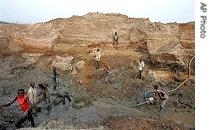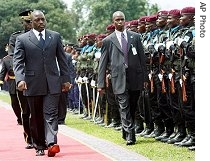As the Democratic Republic of Congo President Joseph Kabila begins his first democratically elected presidential term, he faces the challenge of radical reform in the mining sector, which has been marked by decades of corruption and mismanagement. Phuong Tran reports from VOA's Dakar bureau.
Mining has played a huge role in the DRC economy, forming the bulk of its legal and often illegal exports. When many state-owned mines were privatized during the mid-1990s, large international mining companies rushed to stake a claim to Congo's mineral wealth, which includes cobalt, copper, diamonds, gold, silver, tin and coltan, an essential ingredient in cell phones.

Diamond mine in Mbuji Mayi (file photo)
The trail of tainted minerals has been well-documented in the DRC's most recent wars. Fighters on all sides got supplies of food, money, and military hardware in exchange for smuggled resources.
 |
| Joseph Kabila reviews the troops at the start of his inaugural ceremony at the Presidential Palace in Kinshasa, 6 Dec. 2006 |
Carina Tertsakian with the British-based NGO Global Witness has investigated DRC's mining industry and is watching for signs of reform.
"Even if there are significant changes, it is going to take a lot of effort to reverse what has effectively been decades of very entrenched corruption and fraud from the top down," said Tertsakian.
A two-year UN Security Council investigation recommended a review of all mining contracts that were awarded during war time.
Last year, the transitional government of Joseph Kabila, who took power after his father's assassination in 2001, established a commission to uncover fraud in war time contracts.
Congolese lawmaker Christophe Lutundula headed the investigation panel, which came to be known as the Lutundula Commission.
Its more than 50-page report provides a detailed account of how the DRC was often cheated by international mining companies. The report concluded that many contracts should be re-negotiated, or canceled.
The findings still have not been discussed in the DRC's newly elected lower house of parliament.
Lutundula says that private partners in joint ventures did not have to provide any capital, which left the DRC carrying the debt. The report described other ways that companies took advantage of the lawlessness of the DRC to exploit its resources.
He says that the commission learned how the DRC mining industry was connected to a mafioso international network, and that these relationships are ongoing.
The NGO Global Witness published a study on smuggling in the mines. The report estimates millions in lost revenue in a country where the average income per person is less than $120 a year.
For this study, Tertsakian led a research team in the copper-rich Katanga region of eastern Congo. She talked to miners, exporters, traders, middlemen, NGOs and officials.
"Some of the government officials openly admit that many of the minerals leaving the country are not being registered, not being recorded and not being taxed," said Tertsakian.
"It's going to be a huge battle. The group in Congo that has benefited the most from these mining contracts has been Kabila's entourage," said Patricia Feeney, executive director of Rights and Accountability in Development, a British-based NGO that has been advocating reform.
Lutundula, who was elected as part of the president's coalition, says one person should not be singled out, and that no one has the right to blame anyone else, since, he says, many parties are guilty of bad conduct.
A second group Feeney singles out for blame is the World Bank, which has guaranteed millions in investments to the DRC's mining industry.
The World Bank was instrumental in creating the DRC's 2003 mining code, which was an attempt to make the bidding process more fair. But the code is often ignored by companies and government officials.
"Donors supporting Congo are most reluctant to have the whole issue of how the mining contracts are allocated reopened and properly scrutinized," said Feeney. "The World Bank has shown loss of nerve. We have noticed a desire to protect Western companies that have acquired some of these assets."
The British newspaper The Financial Times reported that the World Bank launched an internal inquiry earlier this year into allegations that the DRC government mismanaged millions in World Bank loans that were intended for reconstruction projects.
The audit results have not been made public.
Craig Andrews, head of the World Bank's Oil, Gas and Mining Policy Division, was on travel and not available for comment for this report.
Other World Bank officials have said they are doing the best they can, and defend their record of dealing with the transitional government. In December of last year, the bank extended a new $90 million loan for post-war economic recovery.
Global Witness researcher Tertsakian says DRC now faces two possible scenarios for the future of its mining sector.
"A pessimistic view would be, well, it is the same people, it is business as usual and nothing is going change. But I do believe that the post-election scenario does present a window of opportunity. This is a government accountable to the electorate in a way that no previous government has really been in the country," said Tertsakian.
Despite the widespread abuse his commission uncovered in the mining industry, Congolese parliamentarian Lutundula is also upbeat about reform.
He says that everyone in the government, regardless of party affiliation, has a stake in the commission's findings about managing the country's natural resources. He says that even if there is disagreement, this discussion is needed in the government, and can lead to results.
He says that one should not be pessimistic about chances for reform.
Related articles
- • Felix Tshisekedi Sworn In as DR Congo President (January 24, 2019)
- • Constitutional Court Declares Tshisekedi Winner of Presidential Election (January 19, 2019)
- • Felix Tshisekedi Vows to Be the President of All Congolese (January 10, 2019)
- • Felix Tshisekedi Elected DR Congo President (January 10, 2019)
- • DR Congo Delays Results of December Election (January 6, 2019)
- • Moise Katumbi blocked from entering DR Congo (August 3, 2018)
- • Botswana Urges Joseph Kabila to Step Down (February 26, 2018)
- • No elections in DR Congo in December without electronic voting machines: INEC (February 13, 2018)
- • US Warns DR Congo Against Electronic Voting for Delayed Election (February 12, 2018)
- • Felix Tshisekedi accuses INEC of illegally prolonging Kabila's mandate (October 24, 2017)
- • DRC Seeks Arrest of Presidential Candidate Moise Katumbi (May 19, 2016)
- • Papa Wemba Is Buried in Kinshasa (May 4, 2016)
- • Papa Wemba Awarded Highest National Honor as Thousands Pay Tribute (May 2, 2016)
- • Rights Groups: DR Congo Must Free Pro-democracy Activists (April 13, 2015)
- • Police Open Fire on Crowd Protesting Election Law Change (January 19, 2015)
- • Etienne Tshisekedi Evacuated to Belgium for Medical Treatment (August 16, 2014)
- • Congo Improves Natural Resources Accounting (July 4, 2014)
- • Kerry Calls on Kabila to Honor Constitution (May 4, 2014)
- • Kerry in DR Congo for Security Talks (May 3, 2014)
- • At least 60 killed as train derails in Katanga province (April 23, 2014)
- • DR Congo Takes Chairmanship of COMESA at Summit in Kinshasa (February 26, 2014)
- • DR Congo Honors Nelson Mandela, Hero and Model for Humanity (December 6, 2013)
- • Kabila Congratulates Congo Army for Defeating M23 Rebels (October 30, 2013)
- • DR Congo Eases Process for Starting a New Business (June 3, 2013)
- • Regional Leaders Sign DR Congo Peace Deal (February 24, 2013)
- • The M23 Rebels Want to Overthrow Kabila? Nonsense (November 28, 2012)
- • Protests Against M23 Rebels, Government and UN Spread (November 22, 2012)
- • Thousands Protest M23 Capture of Goma, Turn on Government and UN (November 21, 2012)
- • DR Congo Officials Vow to Defend Goma Against M23 Rebels (November 19, 2012)
- • Widespread abuse of logging permits opens up Congo's forests to more destruction (October 25, 2012)







